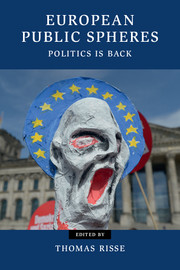Book contents
- Frontmatter
- Contents
- List of figures
- List of tables
- List of contributors
- Preface
- 1 Introduction
- Part I How to grasp the Europeanization of public spheres: theory, methods, empirics
- 2 Theorizing communication flows within a European public sphere
- 3 How advanced is the Europeanization of public spheres? Comparing German and European structures of political communication
- 4 National media as transnational discourse arenas: the case of humanitarian military interventions
- 5 European issue publics online: the cases of climate change and fair trade
- Part II Consequences: does the Europeanization of public spheres matter?
- Part III Theoretical and normative implications
- Bibliography
- Index
3 - How advanced is the Europeanization of public spheres? Comparing German and European structures of political communication
Published online by Cambridge University Press: 05 November 2014
- Frontmatter
- Contents
- List of figures
- List of tables
- List of contributors
- Preface
- 1 Introduction
- Part I How to grasp the Europeanization of public spheres: theory, methods, empirics
- 2 Theorizing communication flows within a European public sphere
- 3 How advanced is the Europeanization of public spheres? Comparing German and European structures of political communication
- 4 National media as transnational discourse arenas: the case of humanitarian military interventions
- 5 European issue publics online: the cases of climate change and fair trade
- Part II Consequences: does the Europeanization of public spheres matter?
- Part III Theoretical and normative implications
- Bibliography
- Index
Summary
If anyone still had any doubt, the euro crisis put the increasing politicization of the European Union (EU) and its policies in plain sight. Research on the Europeanization of public spheres had previously pointed out that if there is a European public sphere deficit, it certainly does not consist of a lack of media attention for European affairs (e.g., Koopmans and Statham 2010a). However, high degrees of visibility and politicization alone are not sufficient to provide the communicative underpinnings for a viable European polity. If politicians and institutions in the EU or other member states appear only as targets of claims by domestic actors and never as speakers in their own right, then media consumers will never have a firsthand view of the opinions and arguments of actors beyond their own national boundaries; they will learn only how domestic actors view the outside world. Similarly, if domestic actors never appear as the targets of claims by actors from the European level or other member states, ordinary citizens will never hear the opinions and arguments that prevail among domestic actors in the critical light of opinions from beyond their own national boundaries. If this were the predominant shape that the politicization and increased visibility of European affairs takes, transnational public-opinion formation could not occur, a genuine understanding of the motivations and interests of nondomestic actors could not arise, and – consequently – there would be no basis for transnational consensus formation or solidarity. Politicization of Europe that takes such a nationally centered shape would not advance beyond the preceding era of depoliticized European politics behind closed doors, and it would have destructive rather than constructive impacts on the European project.
Despite the numerous studies about the Europeanization of public spheres that have appeared in recent years, we still lack a reliable answer to the question of the shape that the politicization of European affairs is taking. Is this politicization of the type that is an integral part of domestic politics and, therefore, a healthy sign of a normalization of European public debates? Or does politicization take the parochial shapes previously described and does it threaten rather than support further progress in European integration?
- Type
- Chapter
- Information
- European Public SpheresPolitics Is Back, pp. 53 - 83Publisher: Cambridge University PressPrint publication year: 2014
- 6
- Cited by



